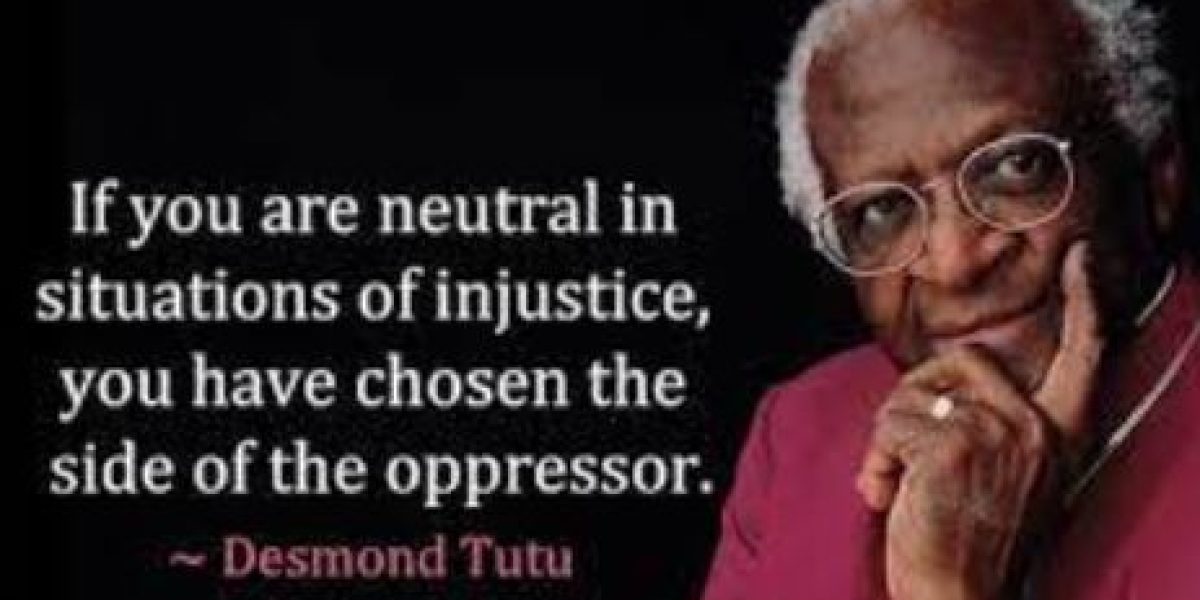The Power of Taking a Stand
Desmond Tutu, a renowned South African Anglican bishop and social rights activist, once proclaimed, “If you are neutral in situations of injustice, you have chosen the side of the oppressor.” His timeless wisdom has resonated with individuals worldwide, serving as a stark reminder of the moral imperative to stand against injustice. In this article, we will explore the profound meaning behind this quote, its relevance in today’s world, and the vital role individuals can play in fostering positive change.
1. The Essence of the Quote
Desmond Tutu’s quote encapsulates the fundamental concept that inaction in the face of injustice is, in essence, an endorsement of the oppressor’s actions. Remaining neutral might seem like a safe option, but it allows injustice to persist. Tutu’s words underscore the need for individuals to recognize their responsibility in the pursuit of justice and human rights.
2. The Relevance Today
Although Tutu’s quote emerged from the struggle against apartheid in South Africa, its relevance extends far beyond that era. Injustice persists in many forms across the globe, from social inequalities and discrimination to environmental degradation and political corruption. This quote serves as a timeless call to action, urging us to take a stand against injustice wherever it rears its head.
3. Taking a Stand: A Moral Imperative
Remaining neutral in the face of injustice raises ethical questions about one’s own complicity. Tutu reminds us that being a bystander to oppression is akin to allowing it to flourish. By refusing to be neutral, we become catalysts for change, asserting our commitment to fairness and justice.
4. The Role of Individuals
Desmond Tutu’s words emphasize the significance of individual action in the face of injustice. Each person has the power to make a difference, whether through advocacy, protest, or simple acts of kindness. It is through collective individual actions that societies transform and move toward a more just and equitable world.
5. The Impact of Historical Figures
Historical figures like Desmond Tutu, who have actively worked against injustice, serve as inspiring examples for others. Tutu’s unwavering commitment to justice, human rights, and reconciliation has left a profound impact on society. He, alongside others like Nelson Mandela and Martin Luther King Jr., has demonstrated that it is possible to make positive change through determined efforts.
6. Overcoming Apathy
One of the main reasons for neutrality in the face of injustice is apathy. People might feel overwhelmed by the scale of the problems or believe that their individual actions won’t make a difference. Tutu’s quote challenges this mindset by reminding us that the path to justice begins with small steps, and a collective effort can lead to significant change.
7. The Responsibility of Privilege
For those who enjoy privilege, Tutu’s quote holds even more weight. Privileged individuals often have a greater capacity to effect change and should use their privilege to stand against injustice. It is a moral obligation to leverage one’s position to uplift those who face discrimination and oppression.
Conclusion
Desmond Tutu’s quote, “If you are neutral in situations of injustice, you have chosen the side of the oppressor,” stands as a timeless reminder of our collective responsibility to fight against injustice. It inspires us to take action, promote equality, and be champions of social justice. While it is not always easy, and the path may be fraught with challenges, the quote underscores that neutrality is not an option when it comes to injustice. To choose the side of justice is to choose a world where everyone can live with dignity and respect.





